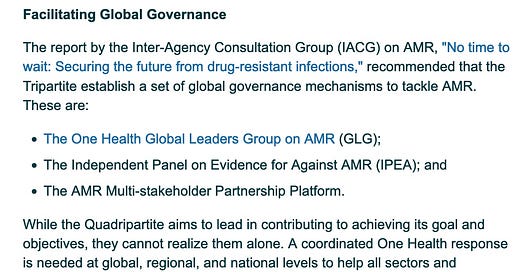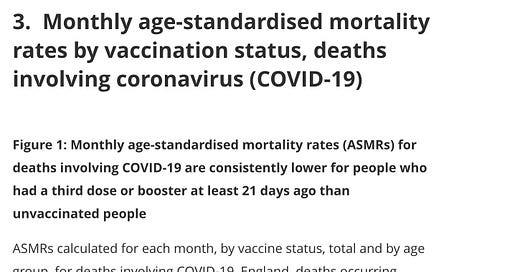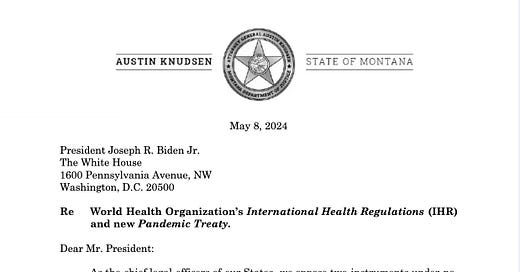
I discuss the new language in the proposed Amendments to the International Health Regulations
Condensing down the meat from the WHO's 46 page Compilation
I will place the new language in block quotes (with a line on the left border) and I will put the removed language in italics. This focuses on proposed changes that may warrant attention.
https://apps.who.int/gb/wgihr/pdf_files/wgihr1/WGIHR_Compilation-en.pdf
Articles 2 and 3 seem to be focused on the development of resilient health systems (whatever that means) and implicitly, getting funding to create them.
“health systems readiness and resilience”
“availability of international financial assistance”
“reference shall be given to the establishment of functioning public health
systems resilient to public health emergencies”
Article 3 also has the very worrisome removal of important language.
The implementation of these Regulations shall be with full respect for the dignity, human rights and fundamental freedoms of persons , which is replaced with the following:
based on the principles of equity, inclusivity, coherence and in accordance with their common but differentiated responsibilities of the States Parties, taking into consideration their social and economic development.
This fuzzy language goes along with more fuzzy, meaningless jargon:
The State Parties shall implement these Regulations on the basis of equity, solidarity as well as and in accordance with their common but differentiated responsibilities and respective level of development of the State Parties.
Article 4 starts telling member nations they must obey.
each State Party should inform WHO about the establishment of its National
Competent Authority responsible for overall implementation of the IHR that will be recognized and held accountable for the NFP’s functionality and the delivery of other IHR obligations.
Article 5 discusses surveillance for diseases and appears to create a surveillance bureaucracy.
WHO shall collect information regarding events through its surveillance activities
and assess, through periodically updated assessment and risk criteria agreed with Member States, their potential to cause international disease spread
“Strengthen the central role of national health authorities in management and
coordination with political, intersectoral, interministerial and multilevel authorities for timely and coordinated surveillance and response in accordance with the international health risk indicated by the IHR, thereby consolidating the central role of national health authorities in multilevel management and coordination.”
Article 6 creates a method to bring in other international agencies involving wildlife, livestock, food and the environment, presumably as a way to impose “One Health” measures. I wrote about the ‘Quadripartite’ in an earlier post — a creation including the WHO, FAO, OIE and UNEP. The quadripartite (formed in 2022) is using the platform of fighting antimicrobial resistance (AMR) for facilitating Global Governance and imposing a “One Health” response. Maybe this is why the true cause of AMR, the use of 80% of our antibiotics in livestock feed as a growth promoter, persists. They needed to retain the problem as an excuse to bring in One Health.
https://www.fao.org/antimicrobial-resistance/quadripartite/who-we-are/en/
And another goody@ https://www.fao.org/publications/highlights-detail/en/c/1619124/
Tackling AMR through One Health will help achieve the Sustainable Development Goals, transform agrifood systems, save millions of lives, preserve antimicrobials for generations and protect the future from drug-resistant diseases.
Here is the new Amendment language, finally:
If the notification received by WHO involves the competency of the International Atomic Energy Agency (IAEA), the Food and Agriculture Organization (FAO), the World Organisation for Animal Health (OIE), the UN Environment Programme (UNEP) or other relevant UN entities, WHO shall immediately notify the relevant national and UN entities.
There is shady language in Article 6 about sharing genomic data with the WHO. While it makes sense to share genomic data on microorganisms, mentioning that national legislation might limit this suggests that perhaps human genomic data could also be shared. Here the WHO wants parties to communicate:
… microbial and genomic data in case of an event caused by an infectious agent, genome sequencing data if available… with regards to the sharing of genetic sequence data it will depend on Member States’ capacity and prevailing national legislation.
Article 12 contains the following, probably as a result of the criticism the WHO received in the past regarding the declaration of a Public Health Emergency of International Concern (PHEIC):
The PHEIC declaration is not designed to mobilise funds in the case of an emergency event. The Director-General should use other mechanisms for this purpose.
Article 15 introduces expert teams to the rescue.
Article 23 adds in the possible requirement of tests and vaccinations for travel (vaccine passport).
Article 35 wants a guarantee of the authenticity of health travel documents, such as QR codes.
Article 36 says that sometimes evidence of recovery from infection could be used for travelling purposes.
Article 43 seems to use fuzzy language that poses the risk James Corbett talked about in his interview with me Dec. 15 on Good Morning CHD.
[Health] measures shall be based on regular risk assessments, provide a proportionate response to the specific public health risks, be reviewed on a regular basis and shall not be more restrictive of international traffic and not more invasive or intrusive to persons than reasonably available alternatives that would attain the highest achievable level of health protection.
Does this open the door to booster shots every few months? Forced medications? Do the WHO or State Parties have the right to force us to do what they say to attain what they consider the highest achievable level of health protection? This sounds very dangerous.
Furthermore, if a country wants to do things differently, and use additional health measures that the WHO does not recommend, for instance use HCQ or IVM, this could land them in trouble.
WHO shall make recommendations to the State Party concerned to modify or rescind the application of the additional health measures in case of finding such measures as disproportionate or excessive. The Director General shall convene an Emergency Committee for the purposes of this paragraph.
Article 44 lays out the new networks and facilities required by the Amendments, and the financing of this buildout; as well as the sharing of specimens, which could be for good or ill, and the sharing does not require a pandemic; as well as the requirement to censor public health information:
States Parties shall undertake to collaborate with and assist each other, in:
strengthening regional planning, preparedness and response, in close cooperation with WHO Regional Offices and relevant international and regional organizations;
(c) the mobilization of financial resources to facilitate implementation of their obligations under these Regulations; and to establish an international financial mechanism for providing financial assistance to developing countries in the development, strengthening and maintenance of core capacities required under these Regulation sand functioning health systems resilient to the public health emergencies.
(c) (New) building capacity to identify emerging public health threats, including through laboratory methods and genome sequencing;
(c) (new) strengthening capacity to identify health threats including through surveillance,
research and development cooperation, technological and information sharing.
(e) (new) collaborating with each other, with WHO, the medical and scientific community, laboratory and surveillance networks, to facilitate timely, safe, transparent and rapid exchange of specimens and generic sequence data for pathogens with the potential to cause pandemics and epidemics or other high-risk situations, given the relevant national and international laws, regulations, commitments and principles, including, as appropriate, the Convention on
Biological Diversity, the Pandemic Influenza Preparedness Framework, and the importance of rapidly securing access to human pathogens for public health preparedness and taking response measures
(f) (new) strengthening cooperation and establishing mechanisms for upgrading coordinating and explaining in contiguous territories programs on health issues that are recognized of being common interest in terms of appropriate response to health risks and emergencies of international concern
(g) (new) developing recommendations and guidance on the use of the digital technologies to improve and modernize communication for preparedness and response to health emergencies, including to better meet the obligations of these Rules
(h) (new)in countering the dissemination of false and unreliable information about public health events, preventive and anti-epidemic measures and activities in the media, social networks and other ways of disseminating such information.
Regarding the sharing of dangerous microorganisms outside of a pandemic, this clause gives the seal of approval to Peter Daszak’s ‘search and transfer’ mission to identify and grab deadly pathogens in over 30 countries for further development in laboratories:
timely, secure and transparent exchange of samples and genetic sequence data of pathogens capable of causing pandemics and epidemics or other high-risk situations
…countering the dissemination of false and unreliable information about public health events, preventive and anti-epidemic measures and activities in the media, social networks and other ways of disseminating such information.
Despite the repeated use of the word equity and verbiage about nations sharing materials and therapeutics, I see no specific plans for how this will be done—making the discussion simply an effort in virtue-signalling.
Article 45 permits the disclosure/dissemination of personal medical information, and pretends that it rquires consent—but the consent is from a nation, not from the persons whose information is being shared!
Article 48 says that the expert advisory committee should be composed of those without conflicts of interest—no doubt as a result of the terrible publicity engendered by the highly conflicted advisers regarding the 2009 swine flu ‘pandemic’, when their lucrative conflicts were discovered.
Article 53 creates a Compliance Committee:
relating to compliance with obligations under these Regulations
Annexes 6-8 deal with vaccine passports. The New Annex 10 deals with the
”OBLIGATIONS OF DUTY TO COOPERATE”
There you have it, in 46 pages. Will the proposed upgrading of their laboratories and public health systems and surveillance systems be sufficient for the African bloc to go along with this huge power grab by the WHO? I imagine there will be even more promised to sweeten the pot, and then at least half the 194 nations who are parties to the WHO will cave…. Time to take action and get the USA out of here.














I think there are a few organizations that need to be disbanded.
The WHO.
The FBI.
The CIA.
The DEA.
The dod.
The NATO Hato.
The EU.
The UK.
The city of London.
The city of Harmacide scamdemic SF killafornia.
The universities. The viruganda abc lamestream media .
The alternative lamestream media.
The lousy liars and the losers who support them.
Send them all to jail and AA...
International regulations imply there is an international authority. There is no legitimate international authority.